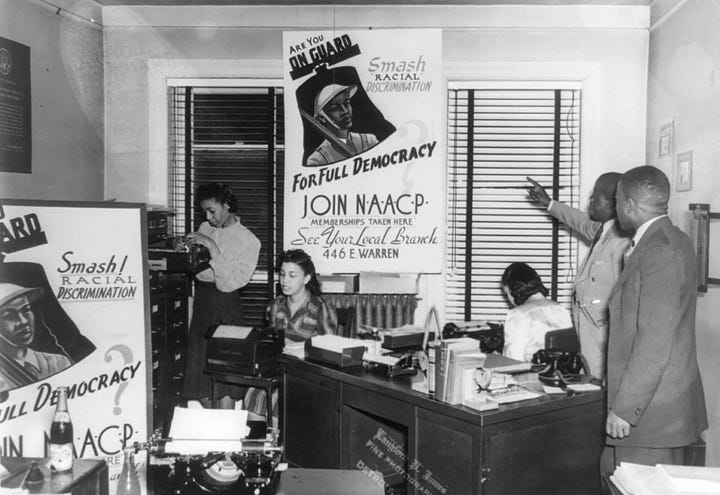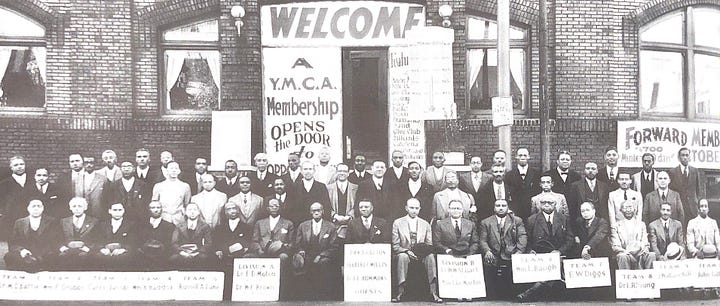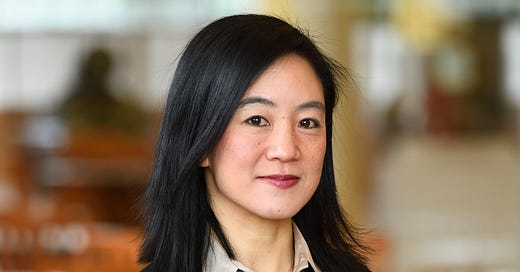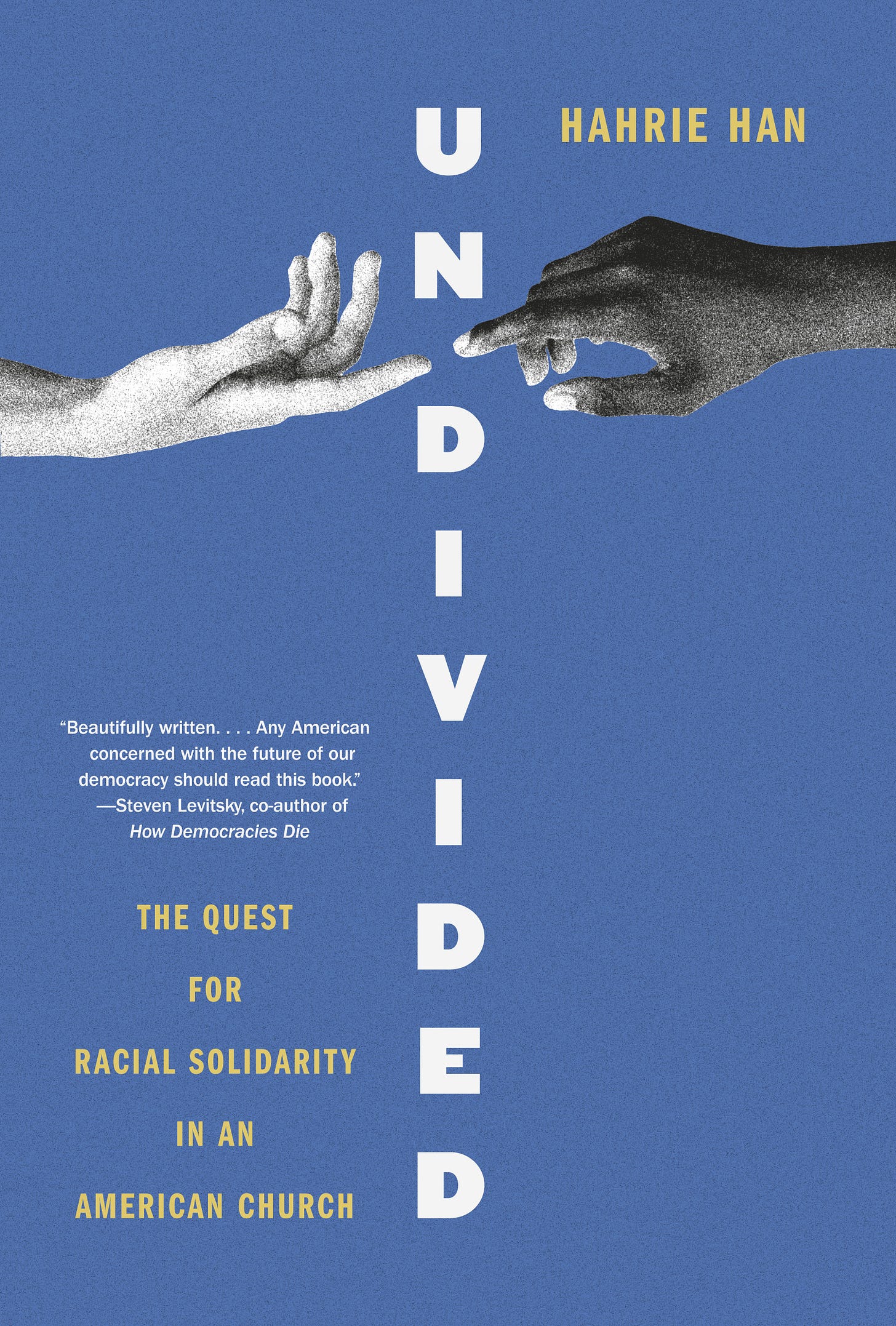Building societal structures to hold the messiness of our relationships
A Q&A with Hahrie Han, author of “Undivided” and political scientist at Johns Hopkins University
Hahrie Han is, in many ways, the contemporary heir to Robert Putnam’s legacy of unearthing the hidden forces shaping civic life. Through her research and writing over the past two decades, Hahrie has documented how disadvantaged people become moved to participate, how grassroots organizations translate engagement to power, and, more recently, how civic opportunity is unequally distributed across the U.S. After meeting Hahrie a few years ago, I’ve truly become an academic fanboy.
So when I learned about her new book, Undivided: The Quest for Racial Solidarity in an American Church, I was eager (perhaps overly so) to interview her for Connective Tissue. Our conversation didn’t disappoint. We covered a lot of ground in our interview and explored several questions on solidarity, faith, and civic life. Why is rootedness critical to facilitating durable social change? What can civil society groups learn from the evangelical church’s emphasis on transformation? And why are the commitments we’re willing to extend to each other deeply related to questions of who deserves grace?
I invite you to dive into this conversation in all its rich messiness. And please consider reading Undivided, supporting Hahrie’s book tour, and following her work.
- Sam
Most of your past books and research have been about grassroots organizing, movement-building, and civic life. Your new book, Undivided, is on a racial justice program within an evangelical megachurch and the people who participate in it. What do you see as the throughline from your past work to this new book?
The core conceptual questions at the heart of my work are: “How do we equip people to become architects of their own future? How do people do that individually? And then how do people come together to forge a common life in which we can all realize a shared vision of the world that we want?” That's what drew me into studying politics: it’s the vehicle through which those things happen.
I grew up as the granddaughter of migrants from North Korea to South Korea. My grandfather and his family moved south before the Korean War. But then, the border was closed at a moment when no one expected, and he lost contact with his mom and he never saw her again. Hearing those stories from my grandfather — and knowing that history — gave me a sense of always keenly understanding what it feels like to be a pawn in a game that someone else is controlling.
To me, the real promise of democracy and the promise of politics is this question of, “How do we build a world in which people don't feel like they're pawns in a game that other people are controlling?” Ultimately, that’s what organizing is about.
And that is absolutely at the core of the question in Undivided: “How do you build racial solidarity within the context of an evangelical megachurch?” The book centers around a group of people who have a faith that they hold sacred, and that faith articulates a set of values about who they want to be and what kind of world they want to see. And, unfortunately, the world isn't like that. So how do they bring those things into alignment — and what can they do about it? Undivided is about this question, “How do they equip their congregation to do that work?”
Reflecting on your experience with Undivided, you write in the book: “Change is radical not when it is extreme, but when it makes change from the roots up. And what I learned from the people I met through Undivided was that making change not only had to alter the roots of an unjust system, but it also had to be rooted in real people.” Can you share a bit more about how you view the role of roots and rootedness, both in Undivided’s work and in facilitating social change more broadly?
When I first went to grad school, I remember taking a class on political institutions. On day one, they define a political institution as “a socially created constraint on human action.” That definition has always stuck with me. This means that we can make them and remake them. But it also means that whatever institution we create, people are going to use those institutions strategically to try to achieve whatever ends they're trying to achieve.
And that’s the reason why rootedness has to be grounded in people who are equipped to act together — it's a mistake to think there's some perfect institutional design out there that's going to create the just world that we want. Whatever institutional design you have, humans are humans, and humans are going to strategically manipulate those institutions to try to achieve their ends. And there are going to be inequalities, power disparities, and injustices that might emerge.
The way that you hold the systems in which we live accountable to a vision of a just world is by having people constantly remake and reimagine what those institutions can be and must be for the world that they want. That's one of the lessons that became clear to me in Undivided. I hope that people don't come away from the book and think, “Oh my gosh, Crossroads Church is this amazing, perfect church,” or “Oh my gosh, Undivided is this perfect program.” I don't think either of those things are true. But what the Undivided program is really good at is equipping people to learn how to hold the systems around them accountable to their goals and visions.
In the past, we’ve talked about the changing nature of civic opportunity and, particularly, how civic life has transformed from “membership to management,” as Theda Skocpol describes it. It strikes me that so much of the thick, robust communities that civil society researchers tout as the ideal — where you have several entry points, and several avenues for deeper participation and leadership — can be commonplace in an institution like the evangelical church. Is this true? If so, what can civic leaders learn from the evangelical approach to organizing and community-building?
What I realized in doing this project — which is obvious now that I say it, but I don't think I had ever put it together this way before — is what differentiates faith institutions from other political institutions in our society is that, at their core, they believe in the transformative power of the institution itself on people. You have to believe that if you're a church, right? You have to believe that you can bring others to God. You have to believe that you can construct a set of experiences — that you can teach others a set of things — that are going to change them from non-believers into believers. If you don't believe in that transformative power, then you're not in the business of being a church.
The transformative potential of civil society institutions is core to that Skocpolian transition that you're talking about from membership to management. These historical membership-based institutions that Theda Skocpol studies were built on the idea that they matter because they equip us with the habits and skills that we need in order to forge a common life with people who are different from us. And as society changed — everything from technology to the structure of our economy — we forgot that this was important. And then we began to create a bunch of institutions that are built more on the notion of search as opposed to the notion of transformation. Churches never gave up on transformation because it's core to their DNA.
There’s one other thing I’ll say on this question. I was raised Catholic, so Protestant evangelicalism is a different theology than the one with which I was raised. Evangelicalism, more so than Catholicism, has at its core this idea of conversion. How do you identify an evangelical? One of the ways is asking if they’ve had a “born again” experience, right? That notion of being born again — that notion of transformation — is essential to the theology of evangelicalism, not only the organizational practice of it. I think that you're right in the sense that there is a way in which a lot of the lessons that those of us in the “civil society” world preach are, in fact, embodied in these churches. But, at the heart, it's because there is this essential “technology,” which is a commitment to transformation. There's no reason why that can't be built into our political organizations, too.
If I think back to the great federated membership networks of the 20th century, lots of them were built on some sort of Judeo-Christian principles — whether you think about the YMCA, or all the Civil Rights Era organizing. And, today, we’re in this time of great religious fragmentation: of shifting toward things that aren't necessarily categorized as religion, but actually have deep religious tendencies. Can you have that sense of transcendence — that sense of moral grounding that developed these thicker civic communities in the past — in this moment of moral fragmentation and religious fragmentation?
That's a really good question. I think there are a couple of things that are true. It's true that people organize their lives around the things that they hold sacred. For some people, it's faith in some divine power. For other people, it's secular. But we all have things that we have decided are sacred to us for whatever reason. It’s also true that we can all have this experience of collective effervescence. Daniel Yudkin, this researcher at More in Common, has a paper that I love that tries to experimentally study the experience of it. He asks, “When people come together, is there a feeling of collective effervescence that's different and greater than the additive sum of its parts?” He argues that this is the case.
For anyone who's been part of an experience of collective action — of coming together with a group of people, of putting your whole hearts into the process of trying to imagine a different world, and then working with each other to realize it — once you have that experience, you can't unhave it. It doesn't have to be connected to a concept of the divine at all. And that experience of collective action is something that we have lost. One of the downstream consequences of the marketization of politics is that we just assume that politics is nothing more than the additive sum of lots of individual choices. We assume there's no room to create and enable and nurture that collective action and collective effervescence.


You’re probably the civil society researcher that I refer to most these days. So, I feel compelled to ask a big question. What’s your vision for a vibrant, regenerated civic life in the U.S.? What will it take to get there, or at least get started?
To me, the vision is a civic life that invites all people to have the experience of collective life that we've been talking about. This civic life would involve a set of civic institutions that are accessible to all different kinds of people and offer them the opportunity to participate in the transformative work of engaging with their neighbors. This civic life would, at a human scale, offer people the experience of being in authentic relationship with others who are part of their community, where they can do and rehearse this work of pluralistic building.
I like to use this metaphor of the honeycomb. Ultimately, we want our civic life to look like a honeycomb — a beehive where you have all these little cells that operate at the human scale that ordinary people can understand. But those cells are all interconnected in a way that creates a bigger whole. And they enable that collective whole to bend without breaking — under the weight of disagreement, under the weight of conflict, under the weight of crisis — all the things that might come up.
Now, how do we get there? Marshall Ganz is someone that we've both worked with in different ways. He says that social change always begins with people who have “both a critical eye and a hopeful heart.” That quote is exactly right. And this is why young people are so often at the forefront of social change: because they have the critical eye and they have no choice but to have a hopeful heart. I really do believe this change has to come from the bottom up — from the roots up, as we talked about before — because, otherwise, it won't be resilient to the ways in which the institutions, themselves, are going to change.
You close Undivided with a moving reflection about how, in the process of doing the research for the book, you developed your own “visceral understanding” of the Christian concept of grace. So, I want to close there, too. How did grace show up among the people who participated in the Undivided program? What role do you believe grace needs to play in our shared lives in community?
I first learned about the concept of grace in Catholic school when I was a kid as this notion of unmerited favor from God. And as an egocentric 12-year-old, I was like, “Whatever.” But as I’ve gotten older and as I’ve had my own children, I’ve seen how they do have unmerited favor. My husband and I deeply love these humans simply because they exist — and this has fundamentally changed my understanding of grace.
What was really powerful about Undivided is it made me recognize the ways in which the faith that a lot of the people brought to the work meant that grace manifested as their respect for the core dignity of people around them. This commitment to other people’s dignity was true regardless of what race or background others might have. And there was a real sense that this dignity was worth fighting for. There’s this political philosopher, Martha Nussbaum, who writes about how we humans inherently love our own people more than we love strangers. Even if I say, “I love all humans,” I can't function throughout my day if I were to have the same sense of compassion for hungry people on the other side of the world as I do for my own child being hungry. Inherently, we have this way in which we tier our emotional commitments to each other. In Undivided, the challenge for many people was, “What if we were to remove some of those tiers of commitments? And what does that imply for what we must do?”
There’s one other thing related to the questions of civic life and democracy that we have been talking about. If democracy is this challenge of people coming together to figure out the kind of shared lives they want to forge, then the behaviors that they use to negotiate difference are going to flow from the commitments they have to each other. So when my husband and I fight, we fight like we want to stay married. We may deeply disagree about things, but we are committed to each other, and so that shapes the way in which we interact with each other. And that should be true in community, too — whether it's one organization or a geographic community or a nation-state or whatever it is. The question of “What commitments are we willing to extend to each other?” is deeply interrelated to this question of “How do we perceive who deserves grace?”
That's beautiful. It makes me think so much about the differences between our deeper commitments versus our shallower commitments — and, particularly, how they are forged in community. When you think about the way that community has transformed from really embedded familial networks or village networks or religious networks, to thinner communities of interest, or thinner communities of identity, or even digitally connected communities with no in-person engagement, it begs the question: “What is the ground on which you're standing to make those deeper commitments? And is that ground sturdy enough and resilient enough to bear the weight of the messiness of it all?”
As anyone who's been in a relationship or family unit knows, it's really messy work. The question facing us now is: “How do we build societal structures that can hold that kind of messiness?”







